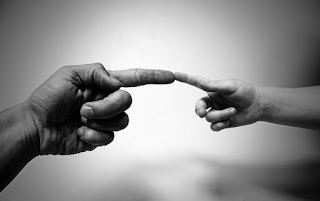Boundaries & Toxic Family: Should You Go No-Contact? (Part 1)
'Tis the season to suffer for many of us. If your abuser was a family member, the holidays may create the perfect storm of suffering. It's a time of year when many survivors start asking themselves, "Should i even be spending time with these people anymore??"
This is a particularly painful situation if your family consistently invites both you and your abuser to family gatherings and expects you to "play nice".
Make no mistake - if your family does this, they are choosing your abuser over you. There's no "go along/get along" involved when one family member harms another. You either take the side of the victim or you take the side of the perpetrator. You can't be on both sides.
Asking a victim to sit down for a holiday meal with the person who hurt them does only one thing - it further harms the victim. It also sends a clear message to the perpetrator: "We choose you".
My mother was far from the perfect mother, but as soon as she learned a family member had abused me, she immediately and permanently cut all ties with the perpetrator. Full stop. So i was spared the torture of having to be around him and act like nothing had happened.
When your family consistently tries to put you and your abuser in the same room together, they are compounding the abuse experience. What happens to the typical victim when they are confronted with their abuser in person?
- They immediately experience shame and humiliation - here they are in a room with the person who did unspeakable things to them - and everyone else in the room probably knows it.
- They become triggered and frightened
- They may start reliving the abuse and replaying it in their minds
- They may begin experiencing panic, dissociation, and the physical symptoms of extreme emotional stress (elevated heart rate, dizziness, disorientation, dry mouth, etc.)
- Their natural social responses become diminished and censored
- In extreme cases, they may be triggered to self-harm or engage in addictive or other harmful behaviors
- They feel betrayed and isolated by their family
- They may engage in self-blaming and self-shaming
Amy was abused by her Uncle Bob in childhood. So it's time for the yearly holiday gathering of family. Amy's Mother invites both Amy and her uncle. If her mother's invitation were truthful, it would read like this:
So here you are - Amy's best friend. What would YOU advise HER to do?
click on image to enlarge
Be the friend to yourself, that you would be to Amy.
You deserve no less. You deserve to THRIVE!
Stay tuned for part 2. We'll look at strategies for establishing boundaries and going low contact or no contact.
Much love to you all! There is hope for you.
Stephanie Shipp
www.thrivetraumarecoverycoaching.com





Comments
Post a Comment